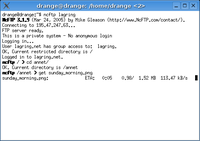 NcFTP downloading a file | |
| Original author(s) | Mike Gleason |
|---|---|
| Developer(s) | NcFTP Software Inc. |
| Initial release | 1991 |
| Stable release | |
| Written in | C |
| Operating system | Cross-platform |
| Type | FTP client |
| License | Clarified Artistic License |
| Website | www |
NcFTP is an FTP client program which debuted in 1991 as the first alternative FTP client.[ citation needed ] It was created as an alternative to the standard UNIX ftp program, and offers a number of additional features and greater ease of use.
Contents
NcFTP is a command-line user interface program, and runs on a large number of platforms.